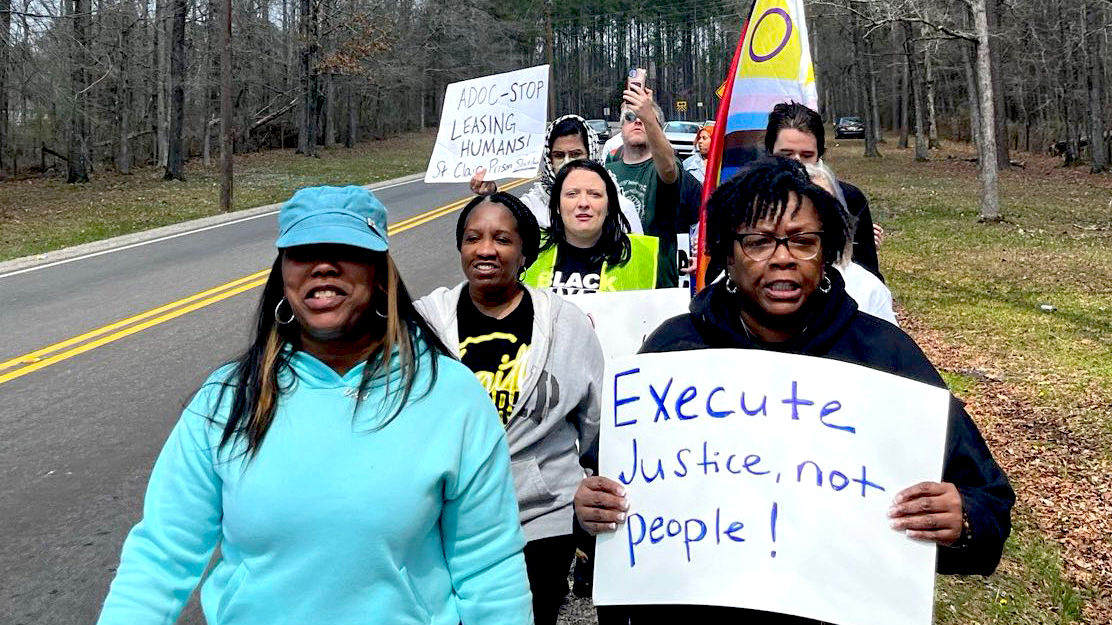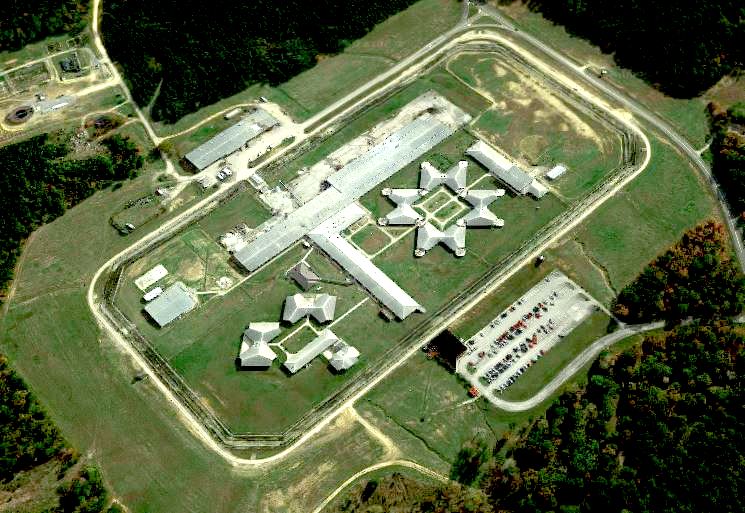Natalia Marques reports on incarcerated organizers in St. Clair prison led by the Free Alabama Movement who are refusing to engage in prison labor.

Activists in solidarity with incarcerated organizers outside of St. Clair prison. (Birmingham DSA)
By Natalia Marques
Peoples Dispatch
 On Saturday will begin the ninth week a group of activists will gather outside St. Clair Correctional Facility, near Birmingham, Alabama, to show solidarity with incarcerated organizers, who have been refusing to engage in prison labor since Feb. 6.
On Saturday will begin the ninth week a group of activists will gather outside St. Clair Correctional Facility, near Birmingham, Alabama, to show solidarity with incarcerated organizers, who have been refusing to engage in prison labor since Feb. 6.
Organizers want to sustain the shutdown, which entails a full stoppage of all labor inside the prisons that prisoners are forced to do, for at least 90 days.
The organizers, led by the Free Alabama Movement, are living under the boot of the most violent state prison system in the United States — a nation known for having the largest prison population in the world and regularly employing torture and archaic methods of execution against its prisoners.
The Alabama Department of Corrections (ADOC) has become notorious for running a regime of violence against prisoners, while employing those same prisoners in a system of legalized slavery.
Incarcerated organizers in Alabama claim that ADOC keeps parole rates artificially low in order to keep as many prisoners in the labor force as possible.
The Free Alabama Movement has organized many statewide prison shutdowns throughout the years.
In 2022, prisoners initiated work stoppages at every single major correctional facility in the state.
In 2016, the Free Alabama Movement organized a shutdown with participation from reportedly 57,000 prisoners — potentially the largest prison shutdown in U.S. history.
Prisoners are now trying to replicate many of the same tactics as the previous shutdowns, by sustaining and trying to expand the shutdown of St. Clair, which began on Feb. 6, for at least 90 days. The goal is to spread the shutdown to all ADOC facilities.
Nope, not stopping. It's going to be an Activist Summer in Alabama. And there's going to be some respect for human and civil rights. . . or Else! https://t.co/MJCCYQXDoG
— ALABAMA PRISONS ARE DEATH CAMPS (@FREEALAMOVEMENT) March 25, 2024
Shutdown, Not a Strike
FAM organizers are intentional about their language, employing the term “prison shutdown” rather than “prison strike.”
According to Cecilia Prado, of the Tennessee Student Solidarity Network, which has been organizing in solidarity with FAM, incarcerated organizers “are participating in work stoppages and boycotts, but they do not call it a prison strike, because they know that people on the outside usually have the idea of prison strikes being related to wages, or to better benefits.”
Prisoners “do not want just better benefits,” Prado says. Instead, FAM organizers want to dismantle the entire system of prison labor, which they label as slavery.
“They want the massive financial incentive of the prison labor economy to go away, because it’s behind the fact that Alabama prisons are the most deadly, most crowded in the country.”

Overhead view of St. Clair Correctional Facility in Alabama. (Prison Insight/Flickr, CC BY 2.0)
Organizations who have stood in solidarity with FAM include the Tennessee Student Solidarity Network, Birmingham Stands, the Party for Socialism and Liberation, the Birmingham Democratic Socialists of America, as well as students from nearby universities such as Middle Tennessee State University, Fisk University, Auburn University, the University of Alabama at Birmingham, Nashville State University, and Vanderbilt University.
Links With Genocide in Gaza
Throughout the prison shutdown, FAM organizers have used their platforms to show solidarity with various struggles, including the struggle in Palestine. On March 2, Young Palestinians Of Birmingham joined the Tennessee Student Solidarity Network and other organizations standing in solidarity with FAM organizers outside of St. Clair.
“The Young Palestinians of Birmingham supports the Free Alabama Movement in their struggle against the prison industrial complex, which is one of several systems that support the Zionist occupation of Palestine and ongoing genocide in Gaza,” Hamza, the president of YPB, told Peoples Dispatch.
“The St. Clair Correctional Facility in particular is the largest source of economic output from prison labor in Alabama. If the system can be shut down— if prison labor can be brought to an end — not only can incarcerated workers demand justice for the abuse and repression they experience at the hands of an oppressive system, but it would also be a major hit to the companies that supply ‘Israel’ with the weapons it needs to continue its extirpation of Palestinians in their native land.”
“Arms manufacturers like Raytheon and Lockheed-Martin not only profit from contracts with the U.Ss military, but also with the Zionist military. These companies create the jets and rockets that the occupation is armed with. The bombs that kill children in Gaza are made in America. Furthermore, these same corporations, along with many others, make billions of dollars from forced prison labor. Incarcerated workers are paid pennies to do work for companies that play a direct part in sustaining the occupation of Palestine and the ongoing genocide,” Hamza said.
Natalia Marques is a correspondent for Peoples Dispatch.
This article is from Peoples Dispatch.
Views expressed in this article may or may not reflect those of Consortium News.

The fact that slavery is still practiced in America is beyond belief.
Even if America were to balkanize into various collections of states and individual states, those polities would continue using this practice.
It is too easy to rationalize this practice of putting prisoners to work. I can just picture some pastor like politician jowls shaking as he admonishes, “idle hands are the devil’s workshop!”
I used to think that prisoner’s labors were limited to kitchen work, peeling potatoes, mopping the floors, wood shop, a la Shawshank Redemption but not actual products that end up on shelves for consumers to profit corporations. Most Americans believe this to be the case.
Most people would answer this news with “do not do the crime if you do not want to do the time.”
Ever since slavery ended, cotton-picking plantation style slavery that is, the Bosses have looked for new ways to get cheap labor. Immigrant labor, workers who are told that they have no rights, have always been one option. There is still some reports of slavery in America from UN Labor organizations, with sex workers and garments mentioned frequently in these reports. But, today, the main source of cheap forced labor for the Bosses is the tough-on-crime politicians and the legions of voters who always vote for them. In most big cities and big states, these politicians have a (D) after their name.
Empty and close the prisons.